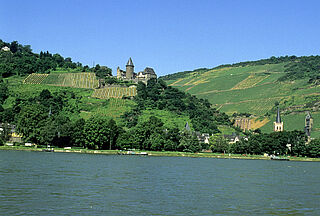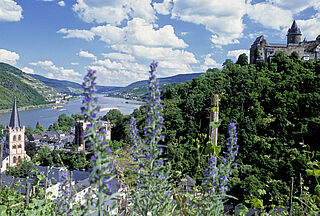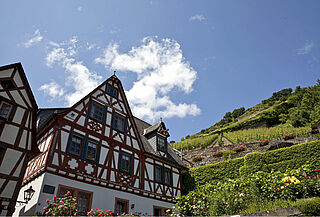Landmarks and Wineculture Details
The wine trading center of Bacharach: Home of Roman god Bacchus
This city honors the ancient God of Bacchus in its name. Bacharach took its name, so legend goes, from the Celtic word "Baccaracum" - meaning Baccarus' farm - or from the Latin word "Bacchiara" which stood for the altar of Bacchus.
In any case, the ancient god of wine left his mark on this city as on no other place: In the Middle Ages, Bacharach was one of the most important trading centers for wine. The reason for that was what is called "The Binger Loch" – a rocky bottleneck in the Rhine which was not navigable by big ships back then. As a consequence, the wine had to be transported through the bottleneck on small boats and was then loaded onto big ships in the harbour of Bacharach. The significance of that transportation system is captivated in the name the wine was called by from that time on: "the Bacharachian."
The history of wine trading is reflected still today in the city's facades: Many of the old timber-framed houses around the historic market place tell of those times. The oldest one was built in 1368 and is appropriately called "Old House." The medieval timber-framed structure houses a famous wine tavern which became the scene of an operetta of Robert Stolz’s. Two centuries later in "Haus Utsch", erected in 1585, Friedrich Wilhelm Utsch who composed the famous German song "The Huntsman of Kurpfalz" lodged there– the house was named in honor of him. During the 19th century, the small village of Bacharach in the heart of the Middle Rhine Valley was thought to be one of the most beautiful places on earth. That was during the era of romanticism, and Bacharach came to be one of its landmarks. Thus it is not surprising that in 2002 the Middle Rhine Valley became part of the World Heritage List of UNESCO.
There were two reasons for Bacharach's fame during the Age of Romanticism: the medieval castle of Burg Stahleck towering over the village – now functioning as a youth hostel – and Werner's Chapel. Legend says that on Holy Thursday in the year of 1287, a 16 years old Christian laborer by the name of Werner was slaughtered here by Jews who stole his blood to prepare the unleavened bread for the Passover holiday. . The story of the ritual murder was false; nevertheless; it incited a bloody persecution of the Jews which spread all the way to the Mosel and the lower parts of the Rhine. As penitence and commemoration, the chapel in Gothic style was erected but never completed. Its distinctive ruins, however, became the very symbol of Rhine romanticism. The wine itself, of course, is commemorated today within the countless small wine taverns throughout the wine village of Bacharach.
Contact
Rhein-Nahe Touristik e.V.
Oberstraße 10
55422 Bacharach
Phone : +49 6743 919303
Fax : +49 6743 919304
info[at]rhein-nahe-touristik(dot)de
www.rhein-nahe-touristik.de
Recommendations for hotels and restaurants
Rhein-Hotel Bacharach
Langstr. 50
55422 Bacharach
Phone : +49 6743 / 1243
info[at]rhein-hotel-bacharach(dot)de
www.rhein-hotel-bacharach.de
Bacharacher Hof
Marktstraße 8
55422 Bacharach
Phone : +49 6743 / 1422
info[at]bacharacher-hof(dot)de
www.bacharacher-hof.de
Weinhaus "Altes Haus"
Marktplatz
55422 Bacharach
Phone : +49 6743 / 1209
hotel.altes.haus[at]t-online(dot)de




